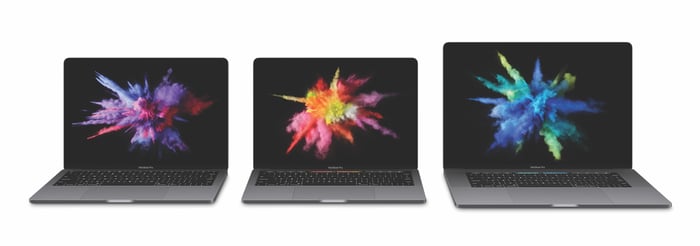You can't win all the time.
Apple (AAPL 0.64%) has a tremendous track record in terms of interface innovations. Many of the company's major breakthroughs over the past four decades have been built on revolutionary interfaces: the graphical user interface on Mac, click wheel on iPod, and capacitive touchscreens on iOS. But Apple has played it relatively conservatively when it comes to the growing market for hybrids, convertibles, and 2-in-1 devices. There is still no touchscreen Mac, in part due to ergonomic considerations, but Apple has pushed capacitive touch interfaces more aggressively than any company over the past decade.
Hence, the Touch Bar. The Touch Bar that Apple launched last year is something of a compromise. By replacing the old function keys with an OLED touchscreen that can change dynamically based on an app's context -- which was the hugely successful pitch for the original iPhone's lack of buttons -- Apple hoped to bring some Multi-Touch capabilities to its most popular laptop. Well, it might have flopped.

One of these is not like the other. Image source: Apple.
Pros still prefer the old model
OSnews is reporting some new rumors regarding Apple's new Mac Pro that it uncharacteristically preannounced earlier this week. Apple had only said that the new professional desktop would not ship this year, but fell short of saying exactly when it was targeting. Development of a newly designed version only began "a few weeks ago," according to the report. In that case, it may not see the light of day until 2019.
Perhaps more interesting is why Apple felt compelled to speak out. The company has been facing unprecedented backlash from professional users, both because the Mac Pro is aging poorly and the whole Donglegate controversy. Asking professionals to go out and buy potentially hundreds of dollars' worth of adaptors and dongles just to use their existing creative tools is not only inconsiderate, it's downright mean. According to the report, the order activity spoke for itself:
What made Apple do a 180? Well, after the announcement of the new MacBook Pro with Touch Bar, orders for refurbished "old" MacBook Pros supposedly went through the roof, and after the initial batch of reviews came out, they shot up even higher. This response to the new MacBook Pro with Touch Bar took Apple completely by surprise. Combined with the problems surrounding the LG UltraFine 5K display and the constant negativity from professional Apple users, the company decided to double down on professional users.
To be fair, professionals are probably more concerned about the need for adaptors than they are about the Touch Bar, but the poor early reception doesn't bode well for Apple's most recent shot at interface innovation.
Touch Bar is underwhelming in its current incarnation
As an Apple loyalist, I purchased one of the new 13-inch MacBook Pros with Touch Bar last year. In the roughly six months since, I can honestly say that it is indeed underwhelming. I actually value the Touch ID sensor more than the Touch Bar itself for the added convenience and security. Relative to traditional function keys, the Touch Bar isn't much of an improvement. In hindsight, it's probably not worth the $300 premium that Apple is asking compared to the non-Touch Bar models.
This is mostly because you have to look down to properly use it since it constantly changes based on what app you're using, and it offers almost no shortcuts that aren't already available through regular keyboard shortcuts or the trackpad. This contrasts with iOS devices, where you're already looking at the touchscreen display, so you know what digital button you're pressing. In fact, we recently had to buy a new professional laptop for my wife, and she specifically opted for the new 13-inch MacBook Pro without the Touch Bar for all of these reasons.
Ultimately, Apple will very likely continue pushing forward with the Touch Bar. This is just the beginning, and it still has potential to be more useful over time if Apple can improve the software. And again, much of the backlash relates to dongles, which may not apply to everyone.





